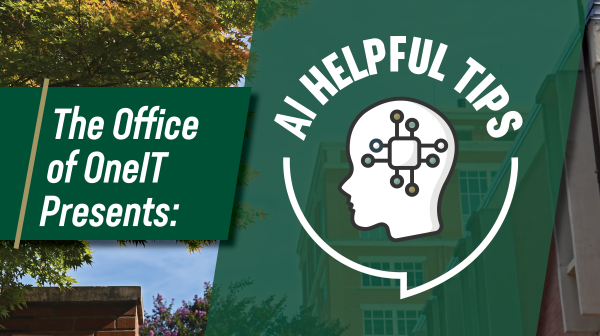AI Helpful Tips: Using AI as a writing assistant

Whether you’re drafting an email response or preparing a report, AI can be a valuable writing tool. At UNC Charlotte, faculty and staff can use AI tools to streamline their writing process, improve clarity, and boost creativity. UNC Charlotte offers university approved options such as M365 Copilot and Google Gemini.
Here’s how AI can support you at 4 key stages of writing:
1. Brainstorm Ideas
Getting started is often the hardest part. AI can help you:
- Generate topic ideas based on your interests or assignment guidelines.
- Explore different angles or perspectives on a subject.
- Create outlines or mind maps to organize your initial thoughts.
Example: Stuck on agenda items for an upcoming retreat? Ask an AI tool to suggest team-building activities for your meeting.
2. Organize Content
Once you have your ideas, structuring them clearly is key. AI can:
- Help you create logical outlines.
- Suggest transitions between sections.
- Identify gaps in your argument or evidence.
Example: If your draft feels disjointed, AI can recommend a more coherent flow or reordering of paragraphs to improve clarity.
3. Adjust Style for Audience and Purpose
Different writing tasks call for different tones and styles. AI can:
- Tailor your writing for academic, professional, or casual audiences.
- Help you match the tone to your purpose—whether persuasive, informative, or reflective.
- Offer suggestions to make your writing more concise or engaging.
Example: Need to turn a technical report into a presentation for a general audience? AI can help simplify jargon and adjust the tone.
4. Check Clarity, Grammar, and Citations
Polished writing reflects well on you and the university. AI tools can:
- Catch grammar, punctuation, and spelling errors.
- Suggest clearer phrasing or sentence structure.
- Assist with citation formatting in APA, MLA, Chicago, and more.
Example: Before submitting your final draft, run it through an AI assistant to ensure your citations are accurate and your writing is error-free.
Important Notes
While generative AI can be an innovative and helpful tool, be aware of potential risks and ethical considerations. Limitations and ethical concerns include:
- Bias In, Bias Out: Generative AI can perpetuate biases present in its training data.
- Data Privacy: Risks of sensitive data being exposed or misused.
- Intellectual Property: Challenges in protecting and respecting copyrights.
- Misinformation: Potential for generating and spreading false information.
Remember, if you use AI, be transparent about your use, give appropriate attribution. Use campus-wide tools with data protection. Don’t use AI for FERPA protected data or sensitive HR and financial information.You are responsible for anything generated by AI.
Use AI as your copilot not an auto-pilot!
Need Assistance? For additional information, visit our AI training resources FAQ page or contact the OneIT Service Desk with any questions or concerns. We’re here to support you in integrating AI tools into your work effectively and securely.